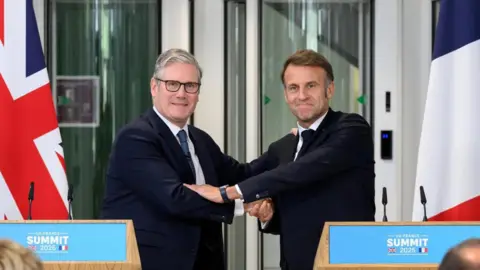Starmer and Macron plead for patience in an impatient world
 Reuters
ReutersWatching the president of France and the prime minister close up was to see two men under the cosh, behind in the opinion polls and fighting for what they see as the essence of their political creed.
It boils down to this - how do Sir Keir Starmer and Emmanuel Macron make the case for what they see as the virtues of patience, nuance, subtleties and trade-offs in an era of growing impatience at the perceived repeated failures of those in high office?
There were just two lecterns and two speakers at the news conference the leaders hosted, but two other parties hovered in the air.
Reform UK and National Rally, the party of Jordan Bardella and Marine Le Pen, were never mentioned explicitly. Nor were their leaders. But they were repeatedly mentioned implicitly.
The two parties on either side of the Channel are not the same, but they have the same capacity to frighten the life out of those in power now.
They do it with an anti-establishment zeal, a knack of communicating in plain language and at a time of disillusionment with the traditional political classes. Quite the combination.
"Whilst we have been working hard to get a returns agreement, others have been simply taking pictures of the problem," the prime minister told us.
Whoever could he possibly have been thinking of?
"That is where the politics is. We have to show that pragmatic politics is the way to deliver the results that matter for both of our peoples," he added, to ensure people weren't seduced by what he called "the politics of easy answers".
Reform leader Nigel Farage had spent the morning on a boat in the English Channel in the company of a camera from GB News and regards this new deal between Paris and London as a humiliation for the UK.
He says the UK should abandon the European Convention on Human Rights and makes a wider argument that the country can escape the funk many feel it is trapped in by embracing a party willing to be unorthodox, noisy and pick a few fights. Why not, after the last few years, goes the argument.
President Macron, confronting similar arguments back home from National Rally, made similar arguments to the prime minister.
There was a need, the president argued, to recognise "the complexity of the world" and to avoid what he saw as the "temptation" for some of those he described as "populists".
As I wrote here the other day, this is the latest evidence we are seeing of the prime minister's shifting argument – a sharpening public critique of Farage and what Sir Keir believes will be the choice at the next election: one of the two of them in Downing Street.
And an outsized part of the argument between the two of them, today and in the coming years, will be over small boat crossings.
New polling for Portland Communications suggests 26% of Labour's voters in last year's general election who have since switched to Reform would be much more likely to come back to Labour if the number of small boat crossings fell.
The same polling suggests that eight out of ten Reform-leaning voters say that after one year, Labour has had enough time to improve things across the piece.
And nearly half of all voters see Nigel Farage as the leader who most represents change.
This is an insight into the challenge and, potentially, opportunity for the prime minister.
Hoping for patience in an era of the opposite, but arguing his opponent is offering a false promise.
Hoping the levers of government can, in time, deliver. Let's see.
One final thought.
On two separate occasions this week I have spoken privately to senior figures in both the Labour Party and the Conservative Party, who, unprompted, offered near identical reflections about how the next few years may pan out.
It won't surprise you that both the people I spoke to don't want to see Reform UK win a general election.
Both acknowledged that it was a real possibility, but both had a deep worry beyond that.
They both reflected that many in the electorate concluded last year that the Conservatives had failed and many in the electorate are concluding this year, or may soon conclude, that Labour are failing too.
Reform could deliver in a way its predecessors never managed.
But what happens, pondered the two people I spoke to, if Nigel Farage was to win and he too was subsequently deemed to have failed?
Where, they wonder, and in what political direction would the country turn in next?
